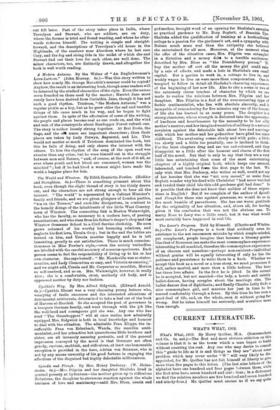Spindle and Plough. By Mrs. Henry Dudeney. (W. Heine- mann.
6s.)—Mrs. Pilgrim and her daughter Shalisha lived in genteel poverty at Syden ham—the mother given up to ridiculous flirtations, the daughter to strenuous reaction against the whole business of love and matrimony—until Mrs. Bless, cousin and godmother, brought word of an opening for Shalisha's energies as practical gardener to Mr. Boaz Boylett, of Bramble Tya, Shalisha added the qualification o? training at a horticultural college to a passion for the gardener's art, and a sympathy with Nature much more real than the antipathy she believed she entertained for all men. Moreover, at the moment when the offer of the situation came, Mrs. Pilgrim was entangled in a flirtation and a money deb" to a terrible auctioneer described by Mrs. Bloss as "the Poundsberry person." Tc buy the mother off cost all the money the girl could raiz( by a sale of effects, and made a hole in Shalisha's own small capital. But a garden to work in, a cottage to live in, and weekly wages to live on were more than compensation. One is tempted to follow in detail all Slaalisha's charming experiences of the beginning of her new life. Also to cite a scene or two of the extremely clever touches of character by which we are made to realise the relations between Mrs. Pilgrim and her daughter. Mrs. Pilgrim is a fool of the ever-recurring type of feeble sentimentalist, who lies with absolute sincerity, and is incapable of remembering for five minutes any one of the lessons of life she has learned in as many years. The daughter is a strong character, whose strength is distorted into the appearance of hardness and heartlessness by the necessity to be her silly mother's mentor, and her imagined vocation of celibacy is a natural revulsion against the detestable talk about love and marriage with which her mother and her godmother have plied her since childhood. The awakening comes slowly and with pain ; a little too slowly and a little too painfully, one is inclined to think. For the later chapters drag and are too sad-coloured, and they disappoint us a little after the humour and charm of the first half of the novel. But that is only to say that they are a very little less entertaining than some of the most entertaining chapters of a highly original book, which keeps one amused, interested, and touched from the first page to the last. We only wish that Mrs. Dudeney, who writes so well, would not say of her heroine that she was "not very moved," or make Boaz Boylett wonder why his dead wife Christobel "had never watched and tended their child like this odd gardener girl had done." Is it possible that she does not know that neither of these expres- sions is English ? But if we complain of the author of Spindla and Plough for these sins against grammar, we would do so in the most humble of parentheses. She has our warm gratitude for the originality of her situation, and, al.ove all, for having given it the conclusion that was not the obvious one. To marry Boaz to Lucy was a little cruel, but it was what would most certainly have happened in real life.










































 Previous page
Previous page